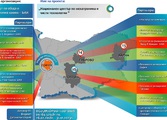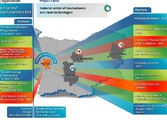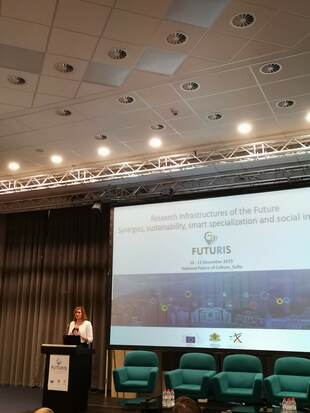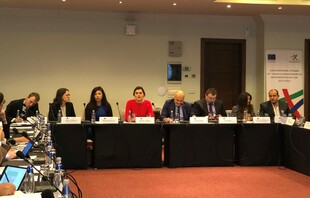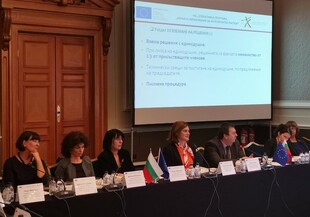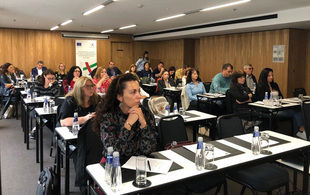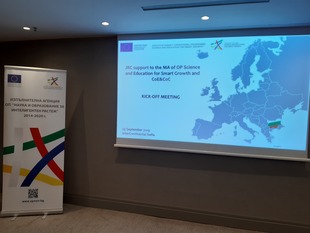Project BG05M2ОP001-1.001-0008 National Centre for Mechatronics and Clean Technologies
Objectives of the Project:
The main goal of the Project National Centre for Mechatronics and Clean Technologies is to build and develop a modern research infrastructure that will contribute to the implementation of the program for sustainable and smart economic growth of the Republic of Bulgaria.
The specific objectives of the Project are:
- Creating a sustainable interdisciplinary Centre of Excellence, to take a worthy place in the European Research Area;
- Active search/demand for business relations and incubation of spin-off companies. Close interaction with the new Centers of Competence;
- Educating a new generation of young scientists, who will be trained for market-oriented science;
- Introducing of the advanced achievements of the world science in the science and the industry;
- Dissemination of knowledge to different target groups (scientific community, industry, trainees, society).
Achieving a qualitatively new level of knowledge in several mutually overlapping economic segments - mechatronics and clean technologies, through the development of specific scientific methods and tools to achieve intelligent design, planning and operation of material resources, energy systems and mechatronic components.
- Society/Community Benefits:
The scientific program is structured in four thematically-oriented work packages, including scientific activities covering the priority areas of thematic area 'Mechatronics and clean technologies'. In each of the work packages the current global and country scientific challenges in the field are considered and specific tasks to be addressed by the scientific staff of the Centre are given. The appropriate understanding of the contemporary issues, the existence of well-functioning infrastructure and multidisciplinary team will provide innovative technology and mechatronic solutions in support of the Bulgarian industry, which will have a positive impact on society and the economy in the country.
The specific areas of impact shall be determined by the specificity of scientific tasks in work packages:
Wp1 Computer modeling and development of technologies and new materials for engineering and re-engineering
Wp1 provides for the creation of new materials and technologies in order to develop components for modern mechatronic systems, through the use of mathematical modeling and computer simulations. The scientific tasks include developing of technology for creation of surface layers with thicknesses from nanometres to millimetres and of bulk metal and non-metal materials with specific properties. The results of the research will build foundational knowledge in the field of clean technologies, sensors, microelectronics and intelligent mechatronic systems. With a high potential for application are the expected results associated with the development of nano-composite materials with Graphene; hybrid materials, alternative to conventional Si-based semiconductors; new materials and technologies for micro-and nanoelectronics; high-tech products for bio-mechatronics, intelligent systems and appliances; supramolecular systems with mechanical connection, which are an important stage in the creation of programmable (molecular) machines.
The developed within the project new methods and technologies will contribute to the improvement of the functional characteristics and prolonging the life of mechatronic systems, to reduce the use of natural resources and hence saving energy.
Wp2 Electronic, optic, sensor and bio-mechatronic systems and technologies
The fields of application of electronic, optic, sensor and bio-mechatronic systems and technologies, developed under this package, include cars, houses, factories and even entire cities that will become increasingly intelligent and connected.
The innovations in terms of functionality, safety, reliability and energy efficiency are increasingly dependent on the miniaturization of electronic systems. The integration of different semiconductor chips into a single chip will receive increasing attention because only such sophisticated microelectronic systems are capable of offering functions needed to cope with the demands of the future.
Developed in this package:
- Semiconductor nanostructures and bulk materials for optoelectronic and photovoltaic applications can be used in LED emitters, infrared detectors, optic memories, photovoltaic cells, etc.;
- Sensors for the detection of chemical agents will find important applications in various fields of industry, biology, agriculture, environmental control, quality of life (pollution control with various inorganic and organic compounds in confined spaces; radiation pollution, etc.);
- Infrared and neutron detectors are widely used in the aerospace and military industries, as well as in civilian applications such as environmental monitoring, industry, security, etc.
- Bio-mechatronic, telemetric and micromechanical systems, based on current technological advances in the field of micro- and nanoelectronics, biology and chemistry, are a prerequisite for creating a qualitatively new scientific product and appropriate technologies for improving the quality of life of large groups of people, disabled people, who are also users of a serious economic (financial) resource.
Wp3 Mechatronic systems and technologies
Wp3 includes the research in the field of virtual engineering and digital industries; transport engineering and re-engineering as well as mechatronic and robotic technologies. The successful implementation of the tasks related to the design, virtual and physical validation of mechatronic systems will create conditions and facilitate further development of new components and mechatronic systems.
The main purpose of the measures provided for to develop technologies for the implantology is the transfer of technology from Mechatronics to medicine in order to improve the quality of life. The potential for the application of the developed methods and technologies is related to the creation of individualized cage with surfaces perfectly fitting the end-plates and decrease of complications. The expected solutions related to digital production and virtual factories also carry the potential for application.
WP4 Clean energy and green technologies
WP4 provides for the development of green and efficient technologies with a focus on transport and energy, which have a huge potential to achieve excellence and solve contemporary problems associated with the climate and energy. The wide range of the defined scientific tasks provides opportunities to impact on the overall economic cycle: from the quantity of raw materials used , to the necessary energy, and the reduction of greenhouse gas emissions.
Research activities in the field of electrochemical, chemical and thermal energy storage will help to achieve the objectives of the European roadmap for materials for low-carbon economy.
- Developments in the field of electrochemical supercapacitors are extremely topical, in view of the growing needs of new efficient technologies for storage of energy generated from renewable energy sources.
- The solving of scientific tasks associated with electrochemical hydrogen technologies will help to make improvements in the functional characteristics and the use of hydrogen fuel and electrolysis cells that are essential component in the solar “green” energy cycle.
- The design of new materials to convert waste heat into electric energy and of anti-reflecting coatings for PV panels is of the utmost importance in reducing greenhouse gas emissions.
- The development of new heat-insulating materials and coatings, the construction of autonomous energy-saving web controlled stations and LED guided environmental systems with 'smart ' controllers and web management are extremely important for the efficient use of energy in all areas of life.
The technologies for obtaining, purification and storage of hydrogen, which will be developed in the Center are the basis for the development of Hydrogen Energetics. The measures provided for fundamental and applied research in the field of catalytic and sorption technologies for control, reduction and purification of gas emissions are directly related to the decision of the EU Member States to reduce emissions by 2030 by at least 40 % relative to 1990, and also the developments to extend the life of products through a higher degree of recycling and reuse are in synchronization with the Paris Agreement from 2015 on climate change. The scheduled tasks for the development of methods for the inclusion of waste products and materials from production in other industries are a prerequisite for the efficient use of raw materials and resources.
- Real results after project finalization:
The implementation of the measures provided for in the project activities aimed at achieving scientific excellence, innovative scientific and applied research, and accelerate the transfer of research to the business will have a positive impact on the improvement of the competitive power of the Bulgarian economy in important technology areas of the country, such as mechanics, electronics, control systems, electro-mobility, fuel cells and hydrogen society.
Тhe set within the research program scientific and scientific and applied tasks provide innovative solutions in achieving the priority directions of the thematic area "Mechatronics and clean technology" to have an effect on greenhouse gas reduction, utilization of resources and efficient use of energy.
The activities provided for in the program for the training and further qualification will ensure the quality of the research and will ensure the continuity and stability of subject-matters. Creation of highly qualified professionals to meet the needs of modern science will help to improve the quality of engineering education, increasing the number of students in engineering majors and reversing the trend of increasing the age of employees, working in the “Mechatronics and clean technology". The results of the implementation of the program for the training and further qualification of scientists in the long run will have a positive influence on the country's significant socio-economic challenges such as low productivity of labor and the low share of high-tech production.
The program for the development of R&D of the Centre provides for the establishment of three unique for the country apparatuses complexes (“TU” complex, specializing in the field of mechatronics; “Lozenets” complex focused on the field of clean technologies and “Geo Milev” complex covering the areas of mechatronics and clean technologies) in which high-quality research will be carried out. The results obtained will help to develop a wide range of innovative solutions in the field of Mechatronics and clean technologies. The activities planned for dissemination of results, and those related to the transfer of knowledge will facilitate the creation of effective contacts between science and business. This will contribute to increase the private investment in public R&D through the creation of joint teams to solve scientific and applied problems and implementation of innovative developments.
The raising of the qualifications of scientists and the improvement of the quality of engineering education will help to improve the innovative potential and technological level of enterprises and will promote the dynamics of innovative processes in Bulgaria. The experience of the teams working in the office of technology transfer (Transmission) of the base organization – Institute of General and Inorganic Chemistry-BAS and of the Centers for technology transfer in the Sofia University and the Technic University will ensure the construction of prospective business contacts, which will further ensure timeliness of scientific developments and will provide high quality, innovative solutions of specific scientific and applied problems.
Building on promising contacts with scientists from internationally recognized research centers is a prerequisite for innovative and competitive-significant developments in support of the Bulgarian business. Each of the priority areas of thematic area 'Mechatronics and clean technology' provides both achievements as with fundamental importance, as well as such like that have a large degree of applicability. The expected effects are linked to the more efficient use of scientific infrastructure to solve significant problems for the industry, enhance the capacity of research teams, efficient use of good practices by the EU and achieving good cooperation and collaborations along the entire value chain. All this will positively affect the development of the various institutions (educational, scientific, manufacturing), for improving the quality of education, for the effective use of scientific infrastructure, and for faster implementation of innovative scientific and applied research.
The project is developed in accordance with global tendencies in the field of Mechatronics and clean technologies, such as widening the scope of human activities, using personal robots, more definitive requirements for energy efficiency in all areas of our lives and significant achievements in the field of clean technologies, and the provided scientific and scientific and applied tasks comply with the possibilities offered by the socio-economic environment in Bulgaria.
The scope of the planned tasks relating to: construction of new and modernization of existing infrastructure, implementation and practical application of innovative and internationally significant research; construction of multidisciplinary research teams and creation of conditions for transparent career of researchers and professional training of students; transfer of knowledge and innovation; the realization of long-term cooperation with leading European partners and distribution of research results, provides the potential for improvement of the entire range of the value chain, including research and development, market feasibility of the results and resolve of socio-economic challenges in the field of Mechatronics and clean technologies. The envisaged management schemes and plans for providing a diverse and sustainable sources of funding ensure efficiency and long-term development of the Centre.
Project site: https://www.cemct.eu/en/
Project National Center for Mechatronics and Clean Technologies
slogan: ЗАЕДНО СЪЗДАВАМЕ/CREATING TOGETHER
Partners:
- Institute of General and Inorganic Chemistry – BAS (coordinator, http://www.igic.bas.bg)
- Institute of Electrochemistry and Energy Systems – BAS
- Institute of Catalysis - BAS
- Institute of Metal Science, Equipment, and Technologies with Hydroaero-dynamics Center - BAS
- Institute of Mechanics- BAS
- Institute of Mineralogy and Crystallography - BAS
- Institute of Optical Materials and Technologies - BAS
- Institute of Organic Chemistry with Centre of Phytochemistry - BAS
- Institute of Polymers – BAS
- Institute of Solid State Physics - BAS
- Institute of Physical Chemistry – BAS
- Sofia University ”St. Kliment Ohridski”
- Technical University of Varna
- Technical University of Gabrovo
- Technical University of Sofia
- University of Chemical Technologies and Metallurgy
- Central Laboratory of Applied Physics - BAS





